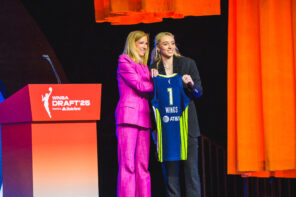The 2017 season for the Atlanta Dream is shaping up to be one that is quite interesting to say the least. The team is playing without one of its premier players and at the basketball arena at Georgia Tech—McCamish Pavilion.
It is somewhat fitting that McCamish is serving as a backup site for the Dream given its team president, Theresa Wenzel, had a 10-year stint at Georgia Tech prior to being named team president last year.
Wenzel was a guest on the Dana Barrett Show on WAFS-AM Biz 1190 in Atlanta and talked not only about her team, but the landscape of women’s sports in general. She feels the onus is on women themselves to push for greater recognition within the mainstream sporting realm.
I think as all the things start to bubble up across the country, what people recognize is if you don’t say anything, you’re never going to get change. And, so there’s a lot of women that in the collegiate space who are very strong personalities who are recognizing that some of the great leaders like Pat Summitt who recently passed away and a couple of the others that without their leadership, they need to step up now.
–Theresa Wenzel
She also disagreed with the notion that women themselves are not fans of women’s sports and pushed back on using the word “fundamental” to describe the play of WNBA basketball.
I enjoy sports. The difference is that, generally, women have a variety of things that they like. So, they’re not just one-sided.
Wenzel later credited one attribute of women’s basketball—its players being more accessible to fans.
Even going up after the game and they go and talk in the stands to fans and all that, is that they’re more accessible.
Another issue mentioned by Barrett and Wenzel is bringing young kids to games—more specifically, young boys, contending a young kid who is into basketball, or sees herself or himself playing it one day, would learn more from the WNBA than the NBA.
The challenge I think at times is for the guys to bring their daughters. And I have had people say this, ‘Well I bring my daughters, like, is there some reason why you can’t bring your sons?
Wenzel and Barrett also talked about how the WNBA can also be used as an engine to attract women who see themselves either as current or future leaders in the corporate world.
You get some of those really high profile coaches that are incredible speakers and you give them the talking points of what you need in business—you can change the landscape.
On the subject of her team, Wenzel feels that the Dream will “surprise” a lot of people this year, but also acknowledged the venue change from Philips Arena (which is undergoing renovations) to Georgia Tech may provide some culture-shock to some fans.
Change, sometimes, is difficult for people to embrace. Obviously, Georgia Tech’s not really that far from Philips, but it’s change.
Regardless of where we play, it’s about supporting the team and really seeing us go after a championship.
Wenzel was also asked if she gets involved in how the coaching staff approaches particular games. As a former golf coach at Siena and a former assistant basketball coach at Canisus College, she says she offers head coach Michael Cooper and his staff some advice, but primarily leaves things in their hands.
Sometimes you just can give somebody that’s a leader a couple of tweaks and help them. But, they’re talented. I don’t need to micromanage anybody.
After going a bit into the differences between the college game and the pro game—particularly with positioning and speed, Barrett asked Wenzel about the WNBA’s ability to market its star players. Wenzel feels the WNBA is doing a better job of putting a spotlight on its premier talent.
While the team is the team, is that people want to know who the stars are. And the women’s sports, and specifically for the Atlanta Dream, we have a couple of key players that also really want to impact social change. And, so they want to be known for what they’re doing on the court, but they want that to bleed off the court and really impact the community in a very positive way.
She believes that part of growing the game is also marketing its players to make them relatable to potential fans. Barrett closed the interview by saying it can be a lesson for business as well since interpersonal relationships with people are what makes business tick.





